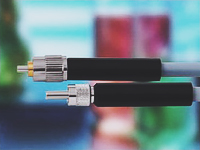 A team of scientists has produced novel compact fiber optic sensors that allow for detecting even slight force parameters affected by tiny objects. To be more precise, such a fiber sensor is ahead of standard force sensors based on micro-electro-mechanical technology.
A team of scientists has produced novel compact fiber optic sensors that allow for detecting even slight force parameters affected by tiny objects. To be more precise, such a fiber sensor is ahead of standard force sensors based on micro-electro-mechanical technology.
The applications of new fiber optic sensors involve various fields beginning from medical devices to manufacturing. Even though such applications are numerous, however, the problem of compact and versatile sensing systems that enable to detect force om small objects yet remains.
This fiber sensor is considered to be the smallest one and most versatile force sensing system that meets all the requirements. The design of the fiber optic sensor includes silica-glass material of cylinder form with 800 microns long and 100 microns in diameter (similar to the diameter of a human hair).
Herewith, fiber optic technology has been already tested and allowed to detect “the force with a resolution better than a micronewton by applying it to measure the stiffness of a dandelion seed or the surface tension of a liquid.” Such benefits of fiber sensors as sensing of high-resolution and wide range are regarded as very useful for sensitive manipulation and machining of tiny objects, surface tension measurements, etc.
When it comes to micro-electro-mechanical technology, these sensing systems offer miniature force sensing capabilities but their applications are very limited because there are requirements in specific protective coatings and numerous electrical connections. It should be noted that the absence of a suitable coating leads to the absence of biocompatibility and such sensors can not be employed in water.
The new fiber optic sensors are made of glass. The scientists use a special etching process developed by them to produce complex optical fiber microstructures. The micromachining technique results in the appearance of a fiber sensor based on a Fabry-Perot interferometer.
Additionally, the coating and an air-sealed cavity of novel fiber sensors make them suitable for application in biochemical environmental conditions. It is possible to put these fiber optic sensors into different liquids, herewith, they detect positive and negative forces and does not require any additional coatings for numerous applications.
Finally, the fiber sensor measures the stiffness of a human hair and common dandelion seed. Moreover, such sensing systems measure the retraction force with a resolution of about 0.6 micronewtons and a range of about 0.6 millinewtons. Herewith, this tiny sensors can be a part of a complex fiber optic sensors, for instance, sensors that detect magnetic and electric fields.
Optromix is a fast-growing vendor of fiber Bragg grating (FBG) product line such as fiber Bragg grating sensors, for example, fbg strain sensors, FBG interrogators and multiplexers, Distributed Acoustic Sensing (DAS) systems, Distributed Temperature Sensing (DTS) systems. The company creates and supplies a broad variety of fiber optic solutions for monitoring worldwide. If you are interested in fiber optic sensor systems and want to learn more, please contact us at info@optromix.com

